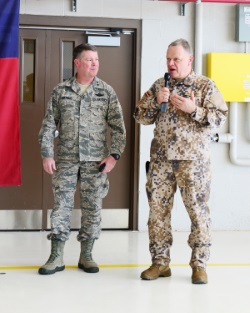Latvian Chief of Defense thanks 147th Reconnaissance Wing Airmen
Story By: 1st Lt. Alicia M. Lacy 147th Reconnaissance Wing Public Affairs
Posted on: March 9, 2016

Lt. Gen. Raimonds Graube, Latvian chief of defense, and Maj. Gen. John Nichols, adjutant general of Texas, speak to members of the 147th Reconnaissance Wing at Ellington Field Joint Reserve Base in Houston, March 4, 2016. Lt. Gen Graube is visiting Ellington Field to meet and talk with members of the 147th Reconnaissance Wing who deployed to Latvia in September of 2015. (Air National Guard photo by Master Sgt. Sean Cowher / Released)
About six months ago, the 147th Reconnaissance Wing made history with the Michigan National Guard and Latvia, flying the first MQ-1B Predator in the Baltic nation.
To reinforce the partnership the three forged over the past year and to thank the U.S. for their support in Latvia, Lt. Gen. Raimonds Graube, Latvian Chief of Defense, visited Texas March 2-5, 2016, making stops at the wing, the wing's state headquarters at Camp Mabry in Austin and at Fort Hood.
"It's good to see familiar faces in Texas," said Graube. "I'm glad to be here to say thank you."
From late August to late September 2016, dozens of Texas Air Guardsmen and Michigan Guardsmen forward deployed to Latvia to exercise remotely piloted aircraft capabilities in support of the European Reassurance Initiative. The ERI is an effort to bolster the security and capacity of NATO allies through a persistent, rotational presence of U.S. forces and by increasing the responsiveness of U.S. forces to contingencies in Central Europe.
"You are a real deterrence for us," Graube said to a group of airmen who deployed, "a show of force...what you did for us last year."
To make the noncombat deployment possible, several National Guard units played critical roles, from Latvia's State Partnership Program partners with the Michigan National Guard laying the groundwork to the 147th providing the unmanned platform and several other units supporting through airlift and personnel.
The 147th was able to jump on board with little notice to mobilize the MQ-1B package to Latvia, sending three Predators, maintenance airmen, communications airmen and pilots.
"(The Michigan National Guard) did a lot of ground work to get us to come," said Maj. Gen. John F. Nichols, adjutant general of Texas. "Y'all have proven that we can do it."
"This is one of the strengths of the Guard," said Maj. Gen. Gregory J. Vadnais, adjutant general - Michigan. "Michigan didn't have that capability and Texas did and it really did help us a lot. To make this happen really helped build a great working relationship with Texas."
Providing the unmanned capability added another dimension to Michigan and Latvia's 23-year partnership, Vadnais said.
With the flight of the Predator, Latvia became the first nation in Europe to develop nationwide RPA flight procedures with countrywide corridors that tie into special use airspace to de-conflict civilian and military flights, as well as allowing for nationwide use of surveillance capabilities to support a range of government needs, from search and rescue to firefighting and border control, said Col. James Andrew Roberts, Combat Readiness Training Center commander, Michigan National Guard.
The mission not only included an exchange with Latvian armed forces on RPA operations, but troops from Lithuania and Estonia also participated in the training mission to familiarize with air traffic management with MQ-1 operations, supporting one of the ERI's objectives.
In addition to thanking the Texas airmen for their support, Graube visited with family members and leaders at Fort Hood to thank the soldiers there who deployed to Latvia and the Baltic region as part of Operation Atlantic Resolve in 2014.
"Americans, boots on the ground are very important to us," Graube said. "We do feel safer because of you, because of our good friends in the United States, in Texas, and Michigan."